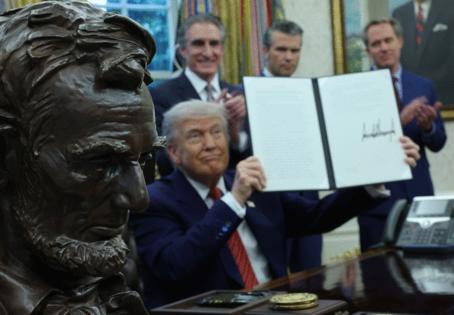US asks appeals court to immediately block Trump tariff ruling
Published in Political News
WASHINGTON — The Trump administration on Thursday asked a federal appeals court to immediately block a lower court ruling that barred the United States from implementing tariffs involving dozens of countries.
The government said in the filing that it plans to seek emergency relief from the Supreme Court on Friday if it doesn’t get “at least” interim relief from the U.S. Court of Appeals for the Federal Circuit.
The administration’s emergency motion also slammed the lower court’s ruling as “unprecedented and legally indefensible,” saying it upended the Trump administration’s efforts to “reorient the global economy on an equal footing.”
“The injunction unilaterally disarms the United States in the face of the longstanding predatory trade practices of other countries — who, notwithstanding the injunction, remain free to impose punitive tariffs on American products,” the administration argued in the filing.
On Wednesday, a three-judge panel of the U.S. Court of International Trade found that the International Emergency Economic Powers Act of 1977 does not allow for “unbounded authority,” finding that the statute could not be used to impose “unlimited tariffs on goods from nearly every country in the world.”
Donald Trump’s tariff decisions exceeded the authority given to him by Congress, the lower court found.
The government in the emergency motion argued that the ruling threatens to “unwind” months of sensitive diplomatic negotiations and foreign policy decision-making at the expense of national security.
It’s the political branches, not the courts, that set economic policy and foreign policy, according to the motion, but the trade court decision “disables the President from using a critical tool that Congress authorized him to wield, in the middle of time-sensitive negotiations with multiple foreign countries over future trade agreements.”
The trade court decision found that “an unlimited delegation of tariff authority would constitute an improper abdication of legislative power to another branch of government.”
The ruling said the imposition of the worldwide and retaliatory tariffs address an imbalance in trade, which it called a “type of balance-of-payments deficit,” so it falls under narrower, non-emergency authorities.
The cases are State of Oregon, et al., v. the Department of Homeland Security, et al., and V.O.S. Selections, et al., v. United States, et al.
©2025 CQ-Roll Call, Inc., All Rights Reserved. Visit cqrollcall.com. Distributed by Tribune Content Agency, LLC.

























































Comments